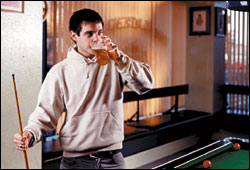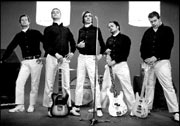WAGON CHRIST
Baltic Room, 625-4444, $10 adv. 9 p. m. Saturday, May 5
MAYBE IT’S TIME Luke Vibert went down to the local county courthouse and got himself an unpronounceable symbol. The U.K. artist, a sort of musical Sybil, has already held his share of on-wax alter egos, from drum-and-bass strangeling Plug to eccentronica muse Wagon Christ, so why not go all the way with a Prince-ly new title? At the moment, he has other priorities; having recently given birth to both a new baby girl and a new album, Vibert’s PalmPilot is full enough, thank you.
Actually, he’s not really the PalmPilot type. Any palm used for scheduling and other essentials would most likely be attached to his wrist and involve the nearest ballpoint pen, not a toothpick-sized plastic stylus. Vibert belongs to the school of odd-duck bedroom headz that counts as members such sonic adventurers as Aphex Twin, Squarepusher, and Mu-ziq—all men who eschew big-budget studio set-ups, preferring to create from the comfort of their own futons. The title of the DJ/producer’s latest, Musipal (Ninja Tune), is equally homemade: “It was something my sister came up with, or the name of this toy of hers when she was like two and a half years old, I’m not sure,” Vibert muses. “When I sent her the new record, she couldn’t believe I was using that, but it’s a friendly sort of record, so I thought it fit.”
First appearing on the scene in 1994 under his own name(!) with Weirs on Rephlex, Vibert went on merrily producing a number of LPs, EPs, and singles for myriad labels in Europe until the one-two punch of Drum & Bass for Papa (as Plug) and Tally Ho! (as Wagon Christ) in the late ’90s made him a name—or, more accurately, names—to be reckoned with stateside. Papa‘s inventive, amusingly spaced-out take on d’n’b brought joy to a genre that hardly had any to spare in the first place, and the even more playful, woozy Tally Ho! pulled kitchen-sink sampling and off-kilter beats into a shimmering downtempo whole. A seemingly left-field collaboration under his own name with steel-pedal guitarist and session musician BJ Cole (not to be confused with two-stepper MJ Cole), 2000’s Stop the Panic, made for a lovely, decidedly mellow marriage between the organic and the mechanic and completed an impressive hat trick for the protean artist.
These multiple nom-de-tunes may get fans believing it’s all in the name; in fact, the opposite is true. “Basically, there is no difference to me, as I just make tracks without worrying about what name they will come out under,” Vibert says. “Often it is in discussion with the record label where the name is chosen, or it might be for contractual reasons. For example, Ninja Tune will do my Wagon stuff for the near future—they preferred to use my Wagon Christ name, since as Luke Vibert I wasn’t very established here—and I am free to do other stuff elsewhere. I did Wagon Christ to get out of my contract with Virgin; I couldn’t release anything as Plug, so I had to use a different name. I only really felt I should be myself when I did the stuff with BJ Cole—I didn’t think it was appropriate for Wagon Christ or anything else. I had another thing I got into [recently], but it was only like six tracks, so not enough for a whole new alter ego, really,” he explains with a laugh.
Is Plug—who has, despite what Vibert says, always been associated with d’n’b in the minds of most fans—a thing of the past? “Drum-and-bass has gone a bit boring and brutal for my tastes,” he admits. “Two-step, on the whole, I find a bit cheesy, although there are notable exceptions in both genres. I like Blowfelt, for example . . . I love that there are people like Plastikman, so cold. I tend to do the warmer stuff, stuff that sounds even like it’s got mistakes in it, but that colder stuff I still think is great. I’m playing a lot of DJ sets lately, and I’m determined not to play the same set twice. So I’m listening to lots of old funk, which I do play, but I don’t like to play it straight. I have to mix it up with techno and lots of other messy tracks.”
What makes it on the stereo at home is a different matter—at least as long as baby Maia is listening. “When my girlfriend first moved in a couple years ago, and we had all these plants, we would play them classical music when we left the house in the morning because it’s supposed to be good for them. So it’s kind of the same principle with our daughter—lots of classical, lots of light FM.” In the end, he’s not intent on creating some sort of Wagon Christ Junior super-offspring, either. He’d be quite happy, he says, “As long as she has her own taste in music, whether it’s Britney Spears or whatever. If that’s what she really likes, I’m pleased.” Spoken like a true Papa.








